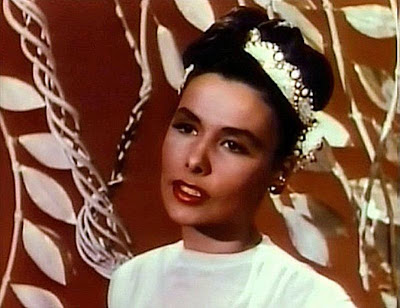In 1960 she signed with Chess Records in Chicago. Despite having 5 years under her belt as a R&B singer, Phil and Leonard Chess felt she had great pop potential and began recording her doing pop standards with a full orchestra. In October 1960, during a standard 4-song session, she recorded A Sunday Kind Of Love, At Last, Stormy Weather and Trust In Me. At Last was released as a single in early 1961. It did well on the R&B charts, but barely broke the Top 50 on the national pop charts. For some reason the recording seems to have been "re-discovered" about 20 years ago and the song became Etta's signature tune for the rest of her career.
Since her 1960 recording the song has been recorded many times by some very well known singers, all drawing inspiration from Etta's recording. In the 1960's it was done by Brenda Lee, Doris Day, Ben E. King, Mary Wells, Judy Garland, Baby Washington. Diane Schuur and B.B. King did a great version in 1994. Stevie Nicks, Celine Dion, Joni Mitchell, Eva Cassidy, Michael Bolton, Cyndi Lauper, Aretha Franklin, Beyonce Knowles, Mariah Carey, Christina Aguilera are just some of the people that have recorded the song in more recent times.
It's also something of a jazz standard, with its slow - bluesy melody it's a good song for musicians to perform that gives them a chance to catch their breath. There's a recording of Miles Davis performing it on 13 September 1953 at the Lighthouse Café in Hermosa Beach, California and that same year another jazz trumpeter, Chet Baker, recorded it. Those are the oldest jazz recordings I'm aware of.
Let's take a look at the song up to the 1960 Etta James recording. The song was written around 1941 by two very successful writers: Mack Gordon and Harry Warren. Mack Gordon is credited with writing the lyrics for songs such Chattanooga Choo Choo, Goodnight My Love, Love Thy Neighbor, Serenade In Blue, The More I See You, You'll Never Know. Composer Harry Warren has credits such as Lullaby Of Broadway, On The Atchison, Topeka & Santa Fe, I Only Have Eyes For You, We're In The Money, September In The Rain, Jeepers Creepers, and the musical 42nd Street.
The song was originally written for Glenn Miller for use in the film Sun Valley Serenade, but only the music was used. In April 1941 production began on another film that would feature the Glenn Miller Orchestra, Orchestra Wives, and this time the song made the final cut.
On 20 May 1942, the Miller Orchestra recorded the song for record release, sung by Ray Eberle.
About a month later, on 25 June 1942, Connie Haines recorded it with the Gordon Jenkins Orchestra.
(Connie's mother passed away here in Clearwater, Florida a couple years ago at the age of 111!)
Also in 1942, it was recorded by Charlie Spivak & His Orchestra featuring the vocals of Garry Stevens & The Stardusters.
The songs seems to have 'left the building' for about 10 years after that. In 1952 it was a hit for Ray Anthony & His Orchestra featuring vocals by Tommy Mercer & The Anthony Choir. It was the success of this record that probably prompted people like Miles Davis and Chet Baker to pick it up.
Also in 1954, in Los Angeles, Richard Berry & The Dreamers recorded it for the Flair label. Richard, about 19 at the time, did it in the R&B vocal group style of that period, again, taking the song in another new direction. Richard was an interesting man on the LA 1950's R&B / Rock 'n' Roll scene. With a wide variety of styles, good sense of humor, and a strong musical acumen, he left us with some great recordings. Ironically, Richard can be heard on the first song Etta James ever recorded, The Wallflower. And then there's the great 1954 recording by The Robins: Riot In Cellblock #9. The song opens with a siren, followed by a machine gun, then someone says "On July the 2nd, 1953 - I was serving time for arm {sic} robbery......." That was Richard. In 1954 mambo was the big thing and the following year Richard wrote a song in a calypso style called Louie Louie. A couple years later he recorded it, nothing much came of it, but there was a very thriving rock 'n' roll scene in the Seattle - Portland corridor in the late 50's/early 60's and it became a favorite of many of the bands there. As you probably know, the song became a rock standard in the 60's, has been recorded over 1,000 times, however Richard had sold the copyright in 1959 for $750. Many years later, in the mid-1980's, Richard was down on his luck, living on welfare, when he was approached by a company that wanted to use the song in a commercial. He explained that he had sold the copyright many years ago but their lawyer thought he might have a chance to regain control. The publisher settled and Richard became an instant millionaire.
By 1959 it was probably inevitable that At Last would receive a rock 'n' roll treatment. This one, by The Chordells, is excellent.
Also in 1959 came this nice version by John Lester & The Mello-Queens.
and that brings us up to October 1960 and Etta James classic.
Note: There were a few other songs titled "At Last" in the 50's/60's. One out of New York City in 1951 by The Majors on Derby records. Another one out of New York City in 1953 by The Velvets on Red Robin records and the 1968 Marvin Gaye recording. All different songs.


+-+At+Last+%5B5-20-42%5D.jpg)





















.jpg)












.jpg)



.jpg)



.jpg)

.jpg)




.jpg)











